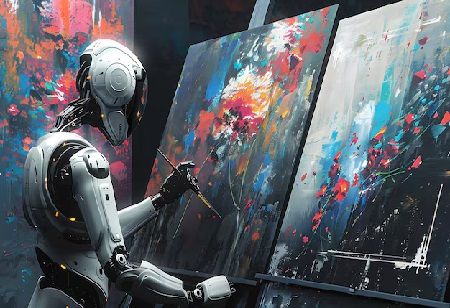- China’s humanoid robot Xueba 01 becomes the first AI to be accepted into a PhD program in Drama & Film at Shanghai Theatre Academy.
- Xueba 01, fluent in Mandarin and capable of mimicking human gestures, will study traditional Chinese opera under Professor Yang Qingqing.
- The move sparks debate on AI in arts and education, balancing innovation with concerns over funding and the emotional depth of human performance.
The first from China, and perhaps the world, a humanoid robot has been accepted into a PhD program in Drama and Film. Called Xueba 01, the robot will study for its doctorate at the Shanghai Theatre Academy, with its subject matter being traditional Chinese opera.
The news was shared at the World Artificial Intelligence Conference in Shanghai. Xueba 01 was developed in collaboration between the University of Shanghai for Science and Technology and DroidUp Robotics and has the ability to communicate with humans both verbally and physically.
It can talk fluent Mandarin, is 1.75 metres tall, weighs 30 kilograms, and is made of silicone skin to replicate facial expressions. Xueba is a Chinese colloquialism for an outstanding student. The name appears apt. The robot will be trained by Professor Yang Qingqing, a Chinese master of performing arts. Its subjects cover stage performance, scriptwriting, set design, motion control, and language generation.
When it rehearsed earlier this year, the robot mimicked a legendary hand gesture, known as the 'orchid fingers', from Chinese Peking opera star Mei Lanfang.
Professor Yang explained that human students in the room subconsciously imitated the robot's movement. She called it a process of 'aesthetic exchange', not a man-vs-machine moment. It's simple to dwell on the machine's hardware or code, but the Shanghai Theatre Academy is more interested in what occurs when technology moves into a traditionally human arena, live performance.
Also Read: Cambodian Students Invent Mobile-Controlled Vacuum Robot
It calls itself an 'AI artist' and has also stated that it wants to work with classmates, exchange script suggestions, and even offer white noise for sleeping. If it graduates from the four-year program, Xueba 01 may end up as a museum-based opera director, or even open an AI art studio. But the development has not been without controversy.
Others have complained on Chinese social media about priorities. They question whether it will divert money from actual human applicants, some of whom make less than 3,000 yuan (US$420) per month. Others wonder if any machine, no matter how sophisticated, can capture the emotional nuances needed in actual performance.
Nevertheless, the experiment has generated much interest. Previously, a previous model of Xueba 01 ran a half-marathon in human disguise and finished third. Taking this leap into performance and narrative, however, might be its most daring attempt yet. For some, the true narrative isn't one of a robot obtaining a degree. It's of what unfolds when education, creativity, and machinery get on the same platform.

